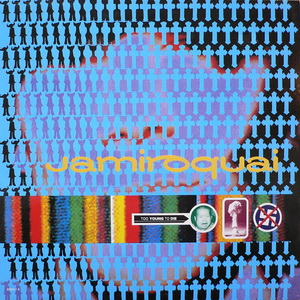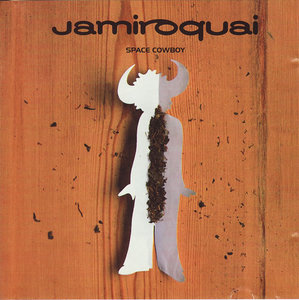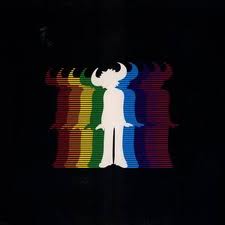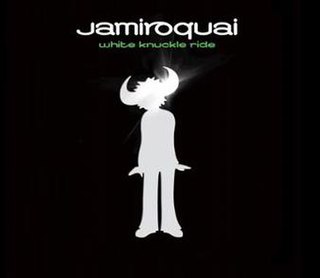
Jamiroquai are an English funk and acid jazz band from London. Formed in 1992, they are fronted by vocalist Jay Kay, and were prominent in the London-based funk and acid jazz movement of the 1990s. They built on their acid jazz sound in their early releases and later drew from rock, disco, electronic and Latin music genres. Lyrically, the group has addressed social and environmental justice. Kay has remained as the only original member through several line-up changes.

The Return of the Space Cowboy is the second album by English funk and acid jazz band Jamiroquai. The album was released on 17 October 1994 under Sony Soho Square. The album continues the musical direction of their debut, Emergency on Planet Earth (1993), and is characterised by its complex songwriting as a result of Jay Kay's creative block mid-production. Its lyrics addressed street life, hope, loss, Kay's drug use, and social matters regarding Native Americans and youth protests.

Travelling Without Moving is the third studio album by English funk and acid jazz band Jamiroquai, released on 28 August 1996 in Japan, then on 9 September 1996 in the United Kingdom under Sony Soho Square. Front-man Jay Kay intended for the album to have a more universal style, revolving around "cars, life and love". Critics have generally praised the album for being more focused and refined than the band's previous work, while others panned its lyrics and found the album too derivative. Its visual concept of sports cars received backlash from press, as it contradicted Kay's environmental beliefs.

"Feels Just Like It Should" is the first single from British funk and acid jazz band Jamiroquai's sixth studio album, Dynamite (2005). Mike Spencer and Jay Kay produced the song. The track was built on a bass line created by Kay as a human beatbox. This bassline initially formed part of an interlude intended to feature on the band's 2001 album, A Funk Odyssey. Still, it was dropped for the album's final version, only appearing on the test pressing. The song was their fourth number-one on the US Dance Chart and peaked at eight on the UK Singles Chart. It was nominated for a Grammy Award for Best Short Form Music Video at the 48th Grammy Awards.

"Stay with Me Tonight" is a song by English synth-pop band the Human League, released in January 1996 by East West Records as a single from their second compilation album, Greatest Hits (1995). It was jointly written by Philip Oakey and producer Ian Stanley, features lead vocals by Oakey; with backing by co-vocalists Susan Ann Sulley and Joanne Catherall. Post production by re-mixers 'Space Kittens'. No music video was prodoced for the single.

"Virtual Insanity" is a song by British funk and acid jazz band Jamiroquai, released on 19 August 1996 by Sony Soho Square as the second single from their third studio album, Travelling Without Moving (1996). The song was written by Jay Kay and Toby Smith, and produced by Al Stone. Its award-winning music video, directed by Jonathan Glazer, was released in September 1996, garnering ten nominations and winning four, including for "Video of the Year", at the 1997 MTV Video Music Awards.

"Voodoo People" is a song by British electronic music group The Prodigy, released on 12 September 1994 as the third single from their second studio album, Music for the Jilted Generation (1994), and as their eighth single overall. It was released as a 12-inch single and in EP format in the United States in 1995 through Mute Records. The guitar riff, based on "Very Ape" by Nirvana, is played by Lance Riddler. The music video for "Voodoo People" was directed by Walter Stern and Russell Curtis.

"Cosmic Girl" is the second single from British funk and acid jazz band Jamiroquai's third studio album, Travelling Without Moving (1996). The song was released in the United Kingdom on 25 November 1996 via Sony Soho Square and in the United States in 1997 via Work Group. It was written by Jay Kay and Derrick McKenzie, and produced by Rick Pope, achieving great chart success, peaking at No. 6 on the UK Singles Chart. The song also reached No. 3 in Italy, No. 4 in Iceland, and No. 10 in Finland. The accompanying music video was directed by Adrian Moat and filmed in Spain. The B-side to the single is an instrumental, "Slipin' 'N' Slidin'", a song originating from another Jamiroquai track called "Mr Boogie", which was a live-only song. "Slipin 'N' Slidin'", just like "Mr Boogie", also has a vocal version.

High Times: Singles 1992–2006 is a compilation album by the British band Jamiroquai that was released on 6 November 2006 in the United Kingdom and 8 November 2006 in Japan.

"When You Gonna Learn" is a song by British funk/acid jazz band Jamiroquai, released as their debut single. It was originally released in October 1992 by Acid Jazz Records before being re-released on Sony Records in September 1993 as the lead single from the band's debut studio album, Emergency on Planet Earth (1993). The lyrical themes, like many of Jamiroquai's early songs, speak of environmental awareness and unfettered capitalism. Its music video was directed by Morgan Lawley and was banned from MTV in its original edit.

"Too Young to Die" is a song by British funk and acid jazz band Jamiroquai, released in March 1993 by Sony Soho Square as the second single from their debut studio album, Emergency on Planet Earth (1993). The song was written by lead singer Jason Kay and Toby Smith, and produced by Kay. The original version of the track runs at 10:18; however, both the single and album versions were cut, running at 3:22 and 6:05, respectively. The single received positive reviews from music critics, who compared Jay Kay to Stevie Wonder.

"Space Cowboy" is the international lead single from British funk and acid jazz band Jamiroquai's second studio album, The Return of the Space Cowboy (1994). Released on 26 September 1994 by Sony Soho Square, the single peaked at number 17 on the UK Singles Chart, number six in Italy, and number three in Iceland. In the United States, it gave the band their first number one on the Billboard Hot Dance Club Play chart. In June 2006, it re-entered the UK Dance Chart at number one. Its music video was directed by Vaughan Arnell and Anthea Benton. The single contains remixes by David Morales, which further put the single in club circulation.

"High Times" is a song by British funk/acid jazz band Jamiroquai, released as the fourth and final single from their third studio album, Travelling Without Moving (1996). Released on 1 December 1997, the song peaked at number 20 on the UK Singles Chart, and reached the top 10 on both the American and Canadian dance charts.

"Emergency on Planet Earth" is a song by British funk/acid jazz band Jamiroquai, released in August 1993 by Sony Soho Square as the fourth and final single from the band's debut studio album of the same name (1993). The song was written by frontman Jay Kay, and has an environmentalist tone, urging the listener to "stop modernisation going on." The track peaked at number 14 on the UK Singles Chart and at number four on the US Dance Chart.

"Alright" is a song by British funk and acid jazz band Jamiroquai, released as the third single from their third studio album, Travelling Without Moving (1996). The song, written by Jamiroquai, contains samples from Eddie Harris' "It's All Right Now" and Idris Muhammad's "Could Heaven Ever Be Like This". "Alright" was released on 28 April 1997 via Sony Soho Square in the United Kingdom, peaking at number six on the UK Singles Chart and at number two in Iceland. It is the group's only single to chart on the US Billboard Hot 100, peaking at number 78. The music video, directed by Vaughan Arnell, features the band performing the song at a party.

"Light Years" is a song by the British funk and acid jazz band Jamiroquai, originally released in 1994 as a song from their second studio album, The Return of the Space Cowboy (1994). It was released as a single on 12 February 1995 by Sony Soho Square and Work, but failed to chart on the UK Singles Chart due to little promotion of the track.

"Half the Man" is a song by British funk/acid jazz band Jamiroquai, released in November 1994 by S2 Records as a single from their second studio album, The Return of the Space Cowboy (1994). The song peaked at number 15 on the UK Singles Chart. Its music video was directed by Paul Boyd. "Half the Man" is in the key of D major.

"Blow Your Mind" is the third overall single to be released from British funk/acid jazz band Jamiroquai's debut studio album, Emergency on Planet Earth (1993). It was released on 24 May 1993 through Sony Soho Square in the United Kingdom, peaking at number 12 on the UK Singles Chart. The song was written by frontman Jay Kay with Toby Smith, and produced by Rick Pope. Its accompanying music video was directed by Vaughan Arnell and Anthea Benton.

"White Knuckle Ride" is the first single from British alternative group Jamiroquai's studio album Rock Dust Light Star. The single was released via Digital Download on 31 October 2010, with a Limited Edition Vinyl release due to appear on 1 January 2011. The song was written by band frontman Jay Kay and Matt Johnson and produced by Kay. It is the band's first record to be released under Mercury Records.

"Automaton" is a song by English funk band Jamiroquai. It was released as the lead single from their eighth studio album, Automaton (2017), on 27 January 2017. The song peaked at number 36 in France, number 61 in Japan, number 65 in Scotland, and number 31 on the U.S. Billboard Dance/Electronic Songs chart.




















